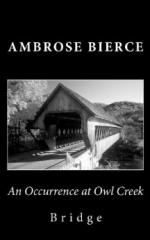|
This section contains 1,237 words (approx. 4 pages at 400 words per page) |

|
In the following essay, Stoicheff analyzes Farquhar's thoughts and actions in terms common to representations of dreams in literature.
"An Occurrence at Owl Creek Bridge" has received more critical attention than any other single work by Ambrose Bierce. This is probably because it combines into one text the best ingredients distributed among much of Bierce's fiction—satire, irony, manipulation of the reader, the exposure of human self-deception, a surprise ending, and a stylistic compression and tautness. It may also be because something of the story still eludes its commentators, leaving a residual and "uncanny" (to use Bierce's convenient term in the text) sense of revelation hovenng just beyond one's grasp. Peyton Farquhar's death at the end is a surprise, so carried away are we by his desire for escape; yet it seems somehow presaged by the very description that keeps it, until the story's last paragraph, obscure...
|
This section contains 1,237 words (approx. 4 pages at 400 words per page) |

|




